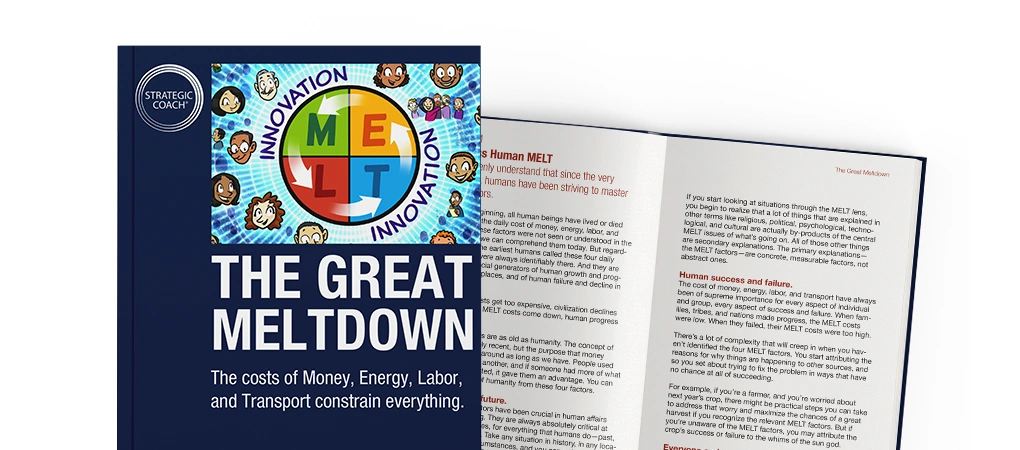Using Who Not How To Transform Your Business: Featuring Christopher Johnson & Katerina Stepanova
The Strategic Coach Team

In Dan Sullivan’s eight-time bestselling book Who Not How, he challenges readers to stop asking, “How can I do this?” and instead ask, “Who can do this for me?”
This question is at the heart of the Who Not How philosophy, and while it may seem simple, it’s not always easy because making this shift involves retraining your brain to stop limiting your potential based on what you can do on your own and instead focus on the infinite and endless connections between yourself and other people—and the limitless transformation possible through those connections.
Hundreds of entrepreneurs have already cracked the Who Not How formula in their lives and businesses, achieving massive growth and exponential personal freedom. Two such entrepreneurs are Christopher Johnson and Katerina Stepanova.
Read on to learn how the Who Not How philosophy revolutionized how they think about and operate their businesses.
Katerina Stepanova’s Who Not How business transformation.
Katerina founded Equity Tree Pro, a software platform dedicated to helping commercial real estate investors manage their deals and investor relations for an affordable price and with educational support throughout the entire investment process. She is also a partner at M2K Partners, where they purchase and manage multiple mobile home park communities.
Katerina has been in Strategic Coach for a year and a half, and since joining the Program, she has learned about and begun to implement the Who Not How philosophy.
Katerina’s Who Not How journey
Before Who Not How, Katerina never took time off work, including nights and weekends, and was often swamped with work that was depleting and uninspiring to her.
Not only that, but the work that often took up her time wasn’t even technically her own. She constantly stepped on her team’s toes and meddled in other departments where she wasn’t an expert.
This frustrated her and her team, making everything more difficult and time consuming. Because of these struggles, growth seemed unattainable because she was already at max capacity. If growing meant working harder and longer, it would be impossible because there aren’t more hours in the day!
Enter Who Not How.
When Katerina first learned about Who Not How, she said, “We couldn’t believe such a simple concept could turn our life upside down in such a positive way.”
With the Who Not How formula, she clarified that her Unique Ability is “putting teams together to make deals happen,” and she learned that she simply needed to step out of the way to let her capable team take care of the rest.
Katerina has redefined what success looks like. She knows now that success isn’t about work volume and working harder and longer. It’s about focusing on what’s most important and doing exactly that.
Today, she works only on what fits within her Unique Ability—what she loves and does best—and hardly touches any other departments in her business. She feels fantastic knowing she’s contributing in the best possible way while no longer getting in her team’s way.
She has since found her superstar “Who”: an inspired and driven collaborator who has helped take her business to the next level.
The best part? It’s working! Her business has since doubled!
Katerina’s Who Not How takeaways and tips
Katerina likes to remind herself that it’s about progress, not perfection. Who Not How requires constant questioning and shifting as your business grows and life evolves.
Strategic Coach’s most popular tool, The Impact Filter, has been an essential Who Not How capability in Katerina’s tool box, and she recommends entrepreneurs use it when identifying who exactly they’re looking for and for what gap in the business. As she explores the “Whos” she needs, she asks, “What needs to be true for this person to succeed in this position? What is an absolute no-go?”
As a starting point for finding your “Who,” she recommends leaning into your network and community for referrals.
Christopher Johnson’s Who Not How business transformation.
Christopher is another Strategic Coach member. He recently sold his company, Rapid Brands, which first appeared on ABC’s hit show “Shark Tank.” Rapid Brands was the United States’ fastest-growing microwave cookware company with offerings including the Rapid Ramen Cooker, the Rapid Mac Cooker, and 18 additional inventions.
The Johnson Group is his current company and the one he’s operated for 18 years. It is a subscription-model talent acquisition company that acts as an in-house corporate recruiter for their clients.
Christopher’s Who Not How journey
Before Who Not How, Christopher had a different psychology and methodology for business success. What he considered his “work ethic”—being the first one in, last one out, and hardest worker—he wore as a badge of honor, despite how it burnt him out and caused him to “plateau” on his entrepreneurial journey.
Despite his success, he didn’t experience much joy along the way, which he realized was evident to others when his 10-year-old daughter once called him the “angry guy.”
Adopting the Who Not How philosophy and framework significantly changed that. In short, he says, Who Not How “shifted the psychology of how to win,” and “winning” didn’t mean working the most or hardest. “Winning” meant achieving freedom and true joy.
He realized that his Unique Ability and best contribution to the business were visioning and creating opportunities and that he didn’t have to do any of the “how” beyond that. He also realized that he’s a great salesperson but limited in his capacity as one person.
To illustrate the math, he shares that he can bring on 30 clients alone if he closes at a 100% success rate. However, with a sales team of 14 of the right “Whos,” even if they succeeded at an 80% rate, much more growth would be possible with much less work from him personally.
Christopher explains, “You’re giving up an excellence mindset for an expansion mindset. And that’s Who Not How.”
By letting go of the need for 100% and instead focusing on collaboration, you open up a new level of possibility that would have never been possible alone.
Another thing Christopher discovered was that he already had good “Whos” on his team. The problem was, they were also stuck doing the “How.” He didn’t see that before and was able to restructure to better leverage Unique Ability Teamwork.
Today, Christopher is experiencing more joy in his business and personal free time than ever before, and he’s no longer the “angry guy” in his daughter’s eyes. He’s experiencing happiness and satisfaction in his life, and he’s surrounded by “Whos” who are multipliers and experts in their particular roles.
Thanks to Who Not How, his business experienced 3,100% growth (not a typo!). In 11 months, his team grew from 4 to 116 people. They took on 400 customers, only five of which Chris signed as part of his team’s training.
Christopher’s Who Not How takeaways and tips
A common question people ask when they begin to think in terms of Who Not How is, “How do you know when to bring in more ‘Whos’?”
Chris answers this question by sharing what NOT to do, and that’s hiring the wrong “Whos.” If you do, you’ll have a team of people who are practicing on your business. That’s detrimental because you have actual costs. It’s better to take your time and bring on your “Whos” carefully and strategically.
Christopher suggests identifying the avatar of the “Whos” you seek and then clarifying the path they can take within your business to go from good to great with your systems and processes.
Initially, adding the right “Who” to the team can be a financial challenge.
Christopher encourages creative and collaborative agreements if you find the right “Who” but they are outside your current budget. If they align and believe in the vision, you could agree to share in the success of the upside or have an agreement to work toward the salary they deserve and desire.
Whatever the pay structure or agreement, remember: the right “Whos” are investments, not costs. You are investing in your freedom, the business’s growth, and their potential as an individual and part of the team. The opportunities they open up and their work should soon be exponentially greater than the dollars you invest.
Katerina and Christopher’s transformative experiences are just two personal accounts of many. Download your free book chapter to see what Who Not How can do for your business and life.







